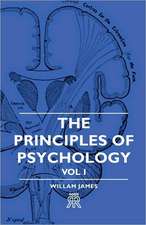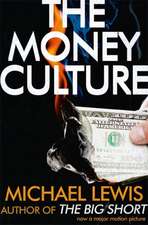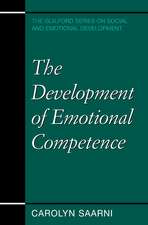Lying and Deception in Everyday Life
Editat de Michael Lewis, Carolyn Saarnien Limba Engleză Hardback – 28 apr 1993
I speak the truth, not so much as I would, but as much as I dare....-- Montaigne
All cruel people describe themselves as paragons of frankness.' -- Tennessee Williams
Truth and deception--like good and evil--have long been viewed as diametrically opposed and unreconcilable. Yet, few people can honestly claim they never lie. In fact, deception is practiced habitually in day-to-day life--from the polite compliment that doesn't accurately relay one's true feelings, to self-deception about one's own motivations.
What fuels the need for people to intricately construct lies and illusions about their own lives? If deceptions are unconscious, does it mean that we are not responsible for their consequences? Why does self-deception or the need for illusion make us feel uncomfortable? Taking into account the sheer ubiquity and ordinariness of deception, this interdisciplinary work moves away from the cut-and-dried notion of duplicity as evil and illuminates the ways in which deception can also be understood as a adaptive response to the demands of living with others.
The book articulates the boundaries between unethical and adaptive deception demonstrating how some lies serve socially approved goals, while others provoke distrust and condemnation. Throughout, the volume focuses on the range of emotions--from feelings of shame, fear, or envy, to those of concern and compassion--that motivate our desire to deceive ourselves and others.
Providing an interdisciplinary exploration of the widespread phenomenon of lying and deception, this volume promotes a more fully integrated understanding of how people function in their everyday lives. Case illustrations, humor and wit, concrete examples, and even a mock television sitcom script bring the ideas to life for clinical practitioners, behavioral scientists, and philosophers, and for students in these realms.
All cruel people describe themselves as paragons of frankness.' -- Tennessee Williams
Truth and deception--like good and evil--have long been viewed as diametrically opposed and unreconcilable. Yet, few people can honestly claim they never lie. In fact, deception is practiced habitually in day-to-day life--from the polite compliment that doesn't accurately relay one's true feelings, to self-deception about one's own motivations.
What fuels the need for people to intricately construct lies and illusions about their own lives? If deceptions are unconscious, does it mean that we are not responsible for their consequences? Why does self-deception or the need for illusion make us feel uncomfortable? Taking into account the sheer ubiquity and ordinariness of deception, this interdisciplinary work moves away from the cut-and-dried notion of duplicity as evil and illuminates the ways in which deception can also be understood as a adaptive response to the demands of living with others.
The book articulates the boundaries between unethical and adaptive deception demonstrating how some lies serve socially approved goals, while others provoke distrust and condemnation. Throughout, the volume focuses on the range of emotions--from feelings of shame, fear, or envy, to those of concern and compassion--that motivate our desire to deceive ourselves and others.
Providing an interdisciplinary exploration of the widespread phenomenon of lying and deception, this volume promotes a more fully integrated understanding of how people function in their everyday lives. Case illustrations, humor and wit, concrete examples, and even a mock television sitcom script bring the ideas to life for clinical practitioners, behavioral scientists, and philosophers, and for students in these realms.
Preț: 371.65 lei
Nou
Puncte Express: 557
Preț estimativ în valută:
71.13€ • 73.97$ • 59.52£
71.13€ • 73.97$ • 59.52£
Carte tipărită la comandă
Livrare economică 15-29 martie
Preluare comenzi: 021 569.72.76
Specificații
ISBN-13: 9780898628944
ISBN-10: 0898628946
Pagini: 221
Dimensiuni: 152 x 229 x 24 mm
Greutate: 0.54 kg
Ediția:New.
Editura: Guilford Publications
Colecția Guilford Press
ISBN-10: 0898628946
Pagini: 221
Dimensiuni: 152 x 229 x 24 mm
Greutate: 0.54 kg
Ediția:New.
Editura: Guilford Publications
Colecția Guilford Press
Public țintă
Professional Practice & DevelopmentCuprins
1. Deceit and Illusion in Human Affairs, Saarni and Lewis.
2. What a Tangled Web: Deception and Self-Deception in Philosophy, Solomon.
3. Animals as Liars: The Human Face of Nonhuman Duplicity, Mitchell.
4. The Development of Deception, Lewis.
5. The Socialization of Emotional Dissemblance, Saarni & von Salisch.
6. Sex Differences in Lying: How Women and Men Deal with the Dilemma of Deceit, DePaulo, Epstein, & Wyer.
7. Looking at Oneself in a Rose-Colored Mirror: The Role of Excuses in the Negotiation of a Personal Reality, Sigmon & Snyder.
8. Lying to Yourself: The Enigma of Self-Deception, Baumeister.
9. Lies that Fail, Ekman & Frank.
10. Understanding Malingering: Motivation, Method, and Detection, Kropp & Rogers.
2. What a Tangled Web: Deception and Self-Deception in Philosophy, Solomon.
3. Animals as Liars: The Human Face of Nonhuman Duplicity, Mitchell.
4. The Development of Deception, Lewis.
5. The Socialization of Emotional Dissemblance, Saarni & von Salisch.
6. Sex Differences in Lying: How Women and Men Deal with the Dilemma of Deceit, DePaulo, Epstein, & Wyer.
7. Looking at Oneself in a Rose-Colored Mirror: The Role of Excuses in the Negotiation of a Personal Reality, Sigmon & Snyder.
8. Lying to Yourself: The Enigma of Self-Deception, Baumeister.
9. Lies that Fail, Ekman & Frank.
10. Understanding Malingering: Motivation, Method, and Detection, Kropp & Rogers.
Notă biografică
Michael Lewis, PhD, is University Distinguished Professor of Pediatrics and Psychiatry and Director of the Institute for the Study of Child Development at Robert Wood Johnson Medical School--University of Medicine and Dentistry of New Jersey. The author of over 300 professional articles, Dr. Lewis has been cited in The New York Times, The Washington Post, Newsweek, and other publications.
Recenzii
Thou shalt not lie, we are all taught. Yet we all do. Lying is necessary to daily life. Saarni and Lewis' book examines why I lie to you, why you deceive me, why advertisers encourage illusion, and why we all manage daily survival only with big chunks of self-deception. After reading this book, you will know, from philosophers and social scientists, how from early childhood we learn to accomplish and rationalize deception and lying. You will know how to distinguish between ungrateful children telling grandma they love the ugly sweater she has knitted and an unfaithful spouse who insists there is no other in his or her life. You will know why we scream the accusation, 'You lied to me,' without apparently caring that the lie covered an affair. This is a book we all need. --Annette Lawson, Ph.D.
I immediately began perusing this volume the evening I brought it home from the office. Although I am not yet finished reading it, I can state unequivocally that it is a joy to read. The writing style of the chapters by DePaulo, Epstein, and Wyer, Lewis, Solomon, and Saarni is truly delightful, and their scholarship is not compromised by their accessible prose. These pages are chock full of insights by some of the most respected researchers in the social psychology of deception. The reader is taken on a journey across continents, decades, and disciplines, examining deceptive practices of all sorts, by all sorts of individuals (including children, spouses, non-Westerners, non-human primates, and philosophers!). Engagingly written and insightful, I plan to use this book in my advanced undergraduate course. --Stephen J. Ceci, Ph.D., Cornell University
-I immediately began perusing this volume the evening I brought it home from the office. Although I am not yet finished reading it, I can state unequivocally that it is a joy to read. The writing style of the chapters by DePaulo, Epstein, and Wyer, Lewis, Solomon, and Saarni is truly delightful, and their scholarship is not compromised by their accessible prose. These pages are chock full of insights by some of the most respected researchers in the social psychology of deception. The reader is taken on a journey across continents, decades, and disciplines, examining deceptive practices of all sorts, by all sorts of individuals (including children, spouses, non-Westerners, non-human primates, and philosophers!). Engagingly written and insightful, I plan to use this book in my advanced undergraduate course. --Stephen J. Ceci, Ph.D., Cornell University
This well-written and thought-provoking book presents something for everyone.
--Readings, 2/7/1993ƒƒThis book contains perhaps everything you want to know about lying and cheating, their origins and perpetuation, and even the pro-social and adaptive uses of deception.
--The Brown University Child and Adolescent Behavior Letter, 2/7/1993Descriere
The book articulates the boundaries between unethical and adaptive deception demonstrating how some lies serve socially approved goals, while others provoke distrust and condemnation.
















